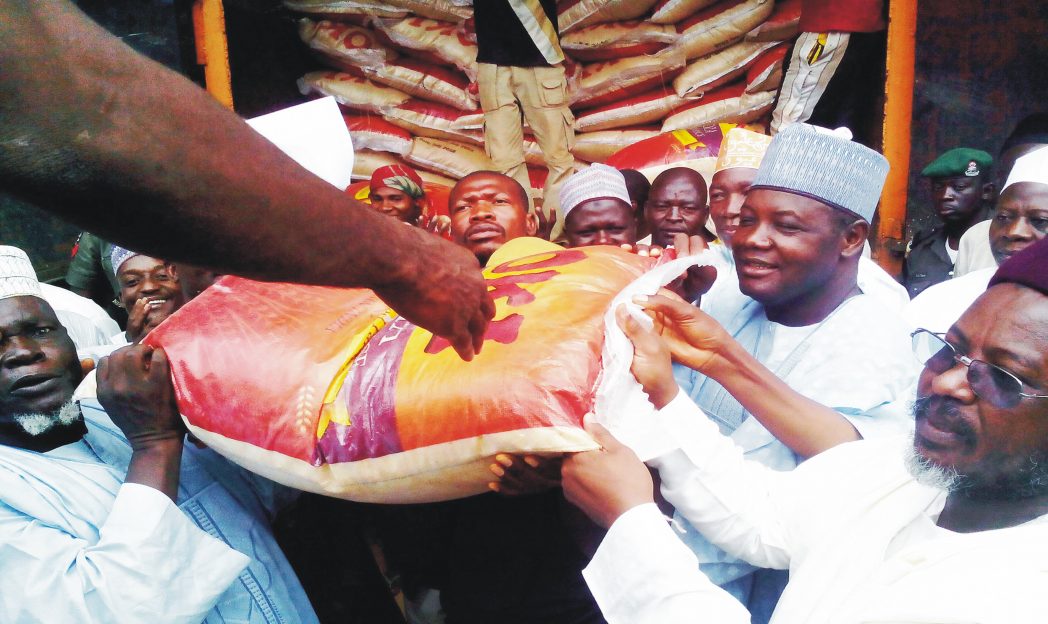Business
FG To Promote Agribusiness Clubs In School – Minister

Nigeria’s Ambassador to Morocco, Senator Abdallah Wali (right), presenting N60m worth of rice to Sokoto State in Sokoto, recently. Photo NAN
The Minister of Education, Malam Ibrahim Shekarau, has that the Federal Government would encourage the setting up of students’ agribusiness clubs in schools.
Shekarau made the disclosure when Dr Baraka Sani, the Senior Special Assistant to the President on Schools Agriculture Programme paid him a courtesy visit.
He said such clubs would boost entrepreneurship among students and promote self reliance.
“We will ensure that all schools have such a club; it is going to be a part of government’s efforts to provide other means of employment.
“It will help to reduce unemployment.
“The situation today is that most school leavers do not have the skills to engage in something else if they are unable to secure admission into higher institutions, hence, they constitute nuisance to the society.
“I appreciate the various aspects of the agribusiness as it will build a sense of enterprise, nation building and patriotism in children,” the minister added.
Earlier, Sani had told the minister that the programme was aimed at introducing young students to the various opportunities contained in agriculture as a business.
She said it would promote skills and change the negative perception about agriculture by the youth.
“The programme is aimed at setting up the structure along with a very strong foundation to ensure success throughout the period of implementation.
“In the pilot phase, Students Agribusiness Clubs (SAC) will be established in selected secondary schools from 12 states of the federation, two from each geo-political zone.
“The areas of interest are livestock, poultry, food and nut processing and packaging, aquaculture, among others,” she said.
She advocated the integration of the programme into the National Secondary Education Curriculum by the Nigeria Educational Research and Development Council (NERDC) and be adopted by the National Council on Education.
The presidential aide said that the integration would offer students who were not studying agriculture the opportunity to benefit from the programme and acquire skills.
The office of the Senior Special Assistant to the President on Schools Agriculture Programme was created on by President Goodluck Jonathan on June 4.
Business
Fidelity Bank To Empower Women With Sustainable Entrepreneurship Skills, HAP2.0
Business
President Tinubu Approves Extension Ban On Raw Shea Nut Export
Business
Crisis Response: EU-project Delivers New Vet. Clinic To Katsina Govt.
-

 News3 days ago
News3 days agoAmend Constitution To Accommodate State Police, Tinubu Tells Senators
-

 Politics3 days ago
Politics3 days agoSenate Urges Tinubu To Sack CAC Boss
-

 News3 days ago
News3 days agoDisu Takes Over As New IGP …Declares Total War On Corruption, Impunity
-
Business3 days ago
President Tinubu Extends Raw Shea Nuts Export Ban To 2027
-
Business3 days ago
Crisis Response: EU-project Delivers New Vet. Clinic To Katsina Govt.
-
Business3 days ago
President Tinubu Approves Extension Ban On Raw Shea Nut Export
-
Sports3 days ago
NDG: Rivers Coach Appeal To NDDC In Talent Discovery
-
Rivers3 days ago
Etche Clan Urges Govt On Chieftaincy Recognition

